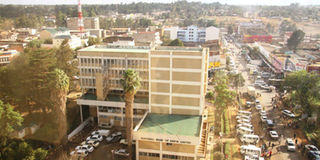Double blow for Eldoret town as firms close shop

A section of Eldoret town. JARED NYATAYA
It was previously the town that ran as the rest crawled, but that no longer holds true for Eldoret. The town is now facing an economic meltdown as more and more industries close shop while others ship out for lack of business.
The town bore the full brunt of the post-election violence, leading to a mass exodus of investors. It is feared that it will take longer before it records economic prosperity unless collapsed industries are revived and new ones established.
The industrial hub of the North Rift is suffering a declining economic growth following the collapse of industries that were behind its rapid expansion 20 years ago.
“The town faces a bleak future, unless the collapsed industries are revived,” said Mr Charles Mose, the Kenya National Chamber of Commerce and Industry Uasin Gishu Chapter chairman.
He regrets that even a few of the industries that have been revived are not operating at full capacity. The factories include Rift Valley Textile Mills (Rivatex), which was placed under receivership before it was bought by Moi University in 2007 and converted into Rivatex East Africa.
Another is Raymond Woollen Mills, which has since been taken over by Ken Knit and the rehabilitated New Kenya Cooperative Creameries.
Government ban
Others like East African Tanning and Extraction Company (Eatec) that was owned by Lonhro East Africa, were sold. It is largely unoperational.
Several small and large scale sawmills have also come tumbling down following a government ban on logging in public forests.
Before its collapse, Rivatex, incorporated in 1975, employed 1,500 people and produced 15.73 million metres of fabric annually. The various products were 5.5 million metres of dyed cotton, 7.7 million metres of printed cotton, and 1.17 and 0.55 million metres of dyed and printed polyester/viscose respectively.
It was placed under receivership in 2000. According to the chamber of commerce, the takeover of the factory has had little impact on the economic growth of Eldoret Town.
“The factory is more of a training and research facility, not a centre for job creation as it was before its collapse,” Mr Mose said.
The government, he added, should have taken over the factory and pumped more cash into it to enable it compete with other textile firms worldwide to create jobs.
“The textile sector is one of the projects under Vision 2030 since it plays an important role in the economic growth of any country in terms of job creation and foreign exchange earnings,” Mr Mose said.
Equipment tax
He asked the government to waive tax on equipment for cotton ginning, weaving and milling to facilitate revival of textile sector.
Mr Mose also called on the government to provide high quality cotton seeds to farmers and offer them attractive prices.
The Ministry of Agriculture has launched the revival of cotton farming in Kerio Valley region by supplying farmers with seeds.
The government has also moved to rehabilitate some of the collapse marketing cooperative societies to motivate farmers to start cotton farming.
The timber industry which, likewise, contributed to the growth of Eldoret Town, suffered a major setback after the government slapped a ban on logging in public forests more than 10 years ago.
Giant factories like Elgeiyo Saw Mills went under, and with it, 1,000 jobs.
Likewise, other small scale sawmills collapsed. “The ban on logging has had a negative impact on the socio-economic welfare of area residents since it has led to declined revenue generation,” said Mr James Koech, a sawmill operator.
Some sawmillers in the region have since turned into commercial farm forestry, which has proved lucrative.
In the dairy sector, it is the same sad story. It has not picked up despite the revival of KCC and the coming up of private milk processing plants.
Most dairy farmers have diversified to other income generating projects while others have abandoned the venture altogether.
The company sank with millions of shillings owed to farmers.
The town is currently surviving on the tertiary institutions and income from maize, wheat and horticulture.
But the council is optimistic. “Eldoret has began recording economic growth due to collaboration between the public and private sectors that has witnessed tremendous investments in property, especially in the town centre,” Town Clerk Stanislas N. Ondimu said.
The council, he added, had realised increased revenue, enabling it to provide quality services. “The speedy approval and transfer of property has boosted investor confidence resulting in rise in development of commercial and residential houses,” he said.
The town links the rest of the country to western Kenya, Uganda and Sudan.
“Investors either buy old buildings, which they renovate, or buy plots and build,” said Mr Kiprono Tum, a real estate agent.




